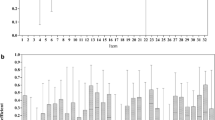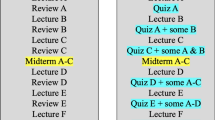Abstract
Using examinations and test results to help students identify cognitive deficiencies as well as inefficient and ineffective study habits and test-taking practices is an effective way to enhance learning. While these approaches are well documented in the general education literature, they have not been well described in medical education. In this descriptive report, we describe a method in which students review their performance on multiple choice examinations with an eye toward identifying specific reasons for selecting an incorrect answer. We provide a worksheet for student use in documenting errors and identifying which among several types of errors were likely made. We offer brief explanations for why particular types of errors are made together with recommendations for remediating those problems. We believe that helping students identify habits of learning approaches used in test preparation that may contribute to an unsatisfactory performance on multiple choice exams represents an important and valuable step toward effective learning and successful exam performance.
Similar content being viewed by others
References
Karpicke EJ, Roediger III HL. The critical importance of retrieval for learning. Science. 2008;15:966–8.
Marsh EJ et al. The Memorial consequences of multiple choice testing. Psychon Bull Rev. 2007;14:194–9.
McDanial MA et al. Generalizing test enhanced learning from the laboratory to the classroom. Psychon Bull Rev. 2007;14:200–6.
Roediger III HL, Karpicke JD. Test enhanced learning: taking memory tests improves long term retention. Psychol Sci. 2006;17:249–55.
Hogan RM, Kentsch W. Differential effects of study and test trials on long term retention and recall. J Verbal Learn Verbal Behav. 1971;10:562–7.
Butler AC et al. Correcting a meta-cognitive error: feedback enhances retention of low confidence correct answers. J Exp Psychol Learn Mem Cogn. 2008;34:918–28.
Butler AC et al. When additional multiple choice lures aid versus hinder later memory. Appl Cogn Psychol. 2006;20:941–5.
Roediger III HL, Marsh EJ. The positive and negative consequences of multiple choice testing. J Exp Psychol Learn Mem Cogn. 2005;31:1155–9.
Help students to learn from returned tests. http://www.duq.edu/about/centers-and-institutes/center-for-teaching-excelence/teaching. Accessed 30 May 2014.
Learning for multiple choice exams. http://sds.uwo.ca/learning/index.html.?mcreturn. Accessed 30 May 2014.
Analyzing returned tests. http://www.usu.ude/arc.idea_sheets/pdf/analyze_ret_test.pdf. Accessed 30 May 2014.
Student success skills: doing a post-test audit. http://www.universitysurvival.com/student-topics/doing-a-post-test-audit. Accessed 30 May 2014.
Test taking errors (based on ATI How to pass a nursing exam). http://www.ttuhsc.edu/media/102505/pptestprep.pdf. Accessed 30 May 2014.
A student guide to multiple choice exams-Taking multiple choice exams. http://www.wwec.edu/geography/ivogeler/multiple.htm. Accessed 30 May 2014.
Notes on Contributors
Michael F. Nolan, Ph.D., P.T. is Professor and Vice Chair of the Department of Basic Science at the Virginia Tech Carilion School of Medicine and Research Institute, Roanoke, VA., USA and Professor Emeritus, Pathology and Cell Biology, USF Health, Morsani School of Medicine, University of South Florida, Tampa, FL, USA.
Author information
Authors and Affiliations
Corresponding author
Appendix
Appendix
Examination Performance Assessment Form (MCQ)
-
1.
In the column marked Question, list the number of each question you answered incorrectly.
-
2.
Choose from the lettered options below the best explanation for why you believe you got the question wrong and write that letter in the column marked Reason.
-
A.
“I just misread the question” “I’ll read more carefully next time”
-
B.
“I know the correct answer was “X,” but I bubbled in “Y”. It was a careless mistake and I need to be more careful in the future.
-
C.
“I had no clue what the right answer was.” “All the answers looked plausible.” “I never saw this material before and I just guessed.”
-
D.
“I was positive the answer was X.” “It was in my notes that way and I learned it that way but the answer key says the answer is Y” “I guess I learned it wrong.”
-
E.
“I thought I really knew this stuff.” “I narrowed it down to two answers, but I just couldn’t decide which one was right.”
-
A.

Rights and permissions
About this article
Cite this article
Nolan, M.F. A Method to Assist Students with Effective Study Habits and Test-Taking Strategies. Med.Sci.Educ. 25, 61–68 (2015). https://doi.org/10.1007/s40670-014-0091-5
Published:
Issue Date:
DOI: https://doi.org/10.1007/s40670-014-0091-5




